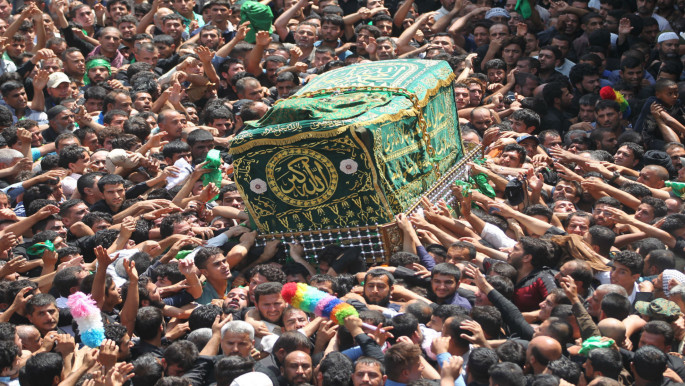Iraqi pilgrims defy IS bombs, march to Baghdad shrine
A sea of pilgrims converged on a Baghdad shrine on Tuesday for an annual Shia religious commemoration, defying fears of bomb attacks by the Islamic State group.
The days-long pilgrimage to mourn the 799 AD death of Imam Musa al-Kadhim came as Iraq wallowed in political limbo after the storming of parliament by protesters on Saturday.
IS has claimed two bombings targeting pilgrims in recent days that have killed at least 37 people, but the attacks have not deterred crowds of black-clad faithful from making the journey on foot.
"This pilgrimage represents a defeat for terrorism," said Mohammed Nayif, a 32-year-old from Babil province, south of Baghdad.
"We are not afraid of the explosions and nothing will stop us," he said, as he marched with tens of thousands of devotees.
Abbas Mustafa, 63, agreed, saying: "The explosions increased my resolve and my strength to challenge these (militants)."
An official from the shrine said that "millions" of people participated in the pilgrimage in recent days.
Many of the main thoroughfares in Baghdad were closed in the days leading up to the annual commemoration of Imam al-Kadhim's death, an important date in the Shia Muslim calendar.
On Tuesday morning, as the commemoration reached its peak, a crowd stretching as far as the eye could see followed a mock coffin through the streets leading to the shrine in Kadhimiya in north Baghdad.
Multitudes of pilgrims, crying and shouting in grief during the symbolic funeral, lunged to touch the coffin as it lurched from one side of the street to the other.
 |
|
| Pilgrims followed a mock funeral procession [AFP] |
Musa Al-Kadhim is the seventh of 12 imams revered in Shia Islam. The pilgrimage to his shrine has in recent years turned into a huge event that brings the Iraqi capital to a standstill for days.
IS has claimed multiple attacks in the Baghdad area targeting the pilgrims.
A car bomb in south Baghdad killed at least 14 people on Monday, while 23 people died in a similar attack on the outskirts of the city two days before.
The extremist group considers members of Iraq's Shia majority to be heretics, and frequently target them in bombings.
Iraqi forces have regained significant ground from IS, which overran large areas north and west of Baghdad in 2014.
But the jihadists still control a major part of western Iraq, and carry out frequent bombings in government-controlled areas.
The pilgrimage and the attacks come as Iraq is mired in a weeks-long political crisis that saw demonstrators break into the capital's fortified Green Zone and storm parliament in an unprecedented security breach on Saturday.
The protesters, angered by parliament's repeated failure to approve Prime Minister Haider al-Abadi's nominees for a new cabinet of technocrats, pulled down slabs from heavy concrete blast walls and scaled the barriers to enter the Green Zone.
The area is home to Iraq's main government institutions as well as various embassies, including those of the United States and Britain.
Demonstrators withdrew from the Green Zone on Sunday, but they warned they would be back if their demands were not met.
Abadi's efforts to replace the current cabinet of party-affiliated ministers has been opposed by powerful political parties that rely on control of ministries for patronage and funds.
No clear plan of action has emerged from any of the main players and several sources said Sadr himself has flown to neighbouring Iran, the main foreign broker among Shia political blocs in Iraq.





 Follow the Middle East's top stories in English at The New Arab on Google News
Follow the Middle East's top stories in English at The New Arab on Google News


